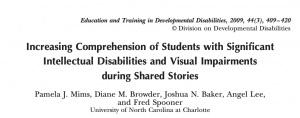Increasing Comprehension of Students with Significant Intellectual Disabilities and Visual Impairments during Shared Stories

Increasing Comprehension of Students with Significant Intellectual Disabilities and Visual Impairments during Shared Stories
By Pamela J. Mims, Diane M. Browder, Joshua N. Baker, Angel Lee, and Fred Spooner
University of North Carolina at Charlotte
Education and Training in Developmental Disabilities, 2009, 44(3), 409–420
Shared stories have been shown to help increase emerging literacy skills in students with significant intellectual disabilities. One important literacy skill is the development of listening comprehension. In this study, least-to-most prompt system was used to promote listening comprehension during shared stories for two students with significant intellectual disabilities and visual impairments. The procedure was evaluated via a multiple probe design across materials (i.e., books). Outcomes indicate that both students improved on the correct numberof comprehension questions answered during all three books. In addition, Student 1 was able to generalize responses across people and settings as well as maintain results. Future research and implications for practical team implementation of the least-to-most prompt system to teach listening comprehension are discussed.
